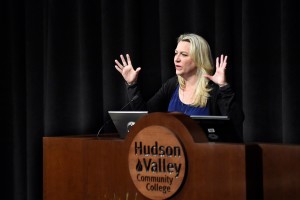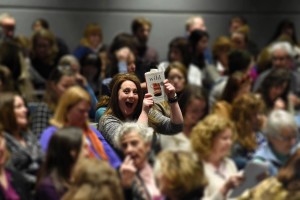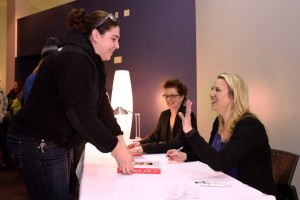Bearing the things we cannot bear: Author Cheryl Strayed discusses her journey
By Andrea Currie
News Editor
On Thursday, Mar. 12, best-selling author Cheryl Strayed spoke to a full house in the BTC Auditorium, with dozens more watching via screens in the BTC meeting rooms. At 4 p.m., a line was already forming for her free 7 p.m. talk, which was open to the public. Just after 5 p.m., the doors opened, a full hour ahead of schedule, so that the hundreds of people waiting could take seats in the auditorium.
At 7 p.m., Maria Zemantauski, Hudson Valley coordinator of cultural affairs, introduced Strayed, saying, “[W]hat is most brilliant about the way she shapes and shares her story is that she makes us feel like she could be any one of us. She inspires us to embrace our own lives, our own journeys, and our own stories.”

Strayed entered to loud applause and thanked the audience for attending. She said that she would spend most of the evening talking rather than reading, since she thought it was most interesting to hear writers explain “the story behind the story.”
Strayed said that she would mostly discuss her memoir, Wild. When she asked the audience how many of them had read Wild, nearly everyone raised their hands.
Strayed summarized Wild as an account of her 1100-mile hike on the Pacific Crest Trail in the summer of 1995, when she was 26 years old. She said, “I really began that journey at what I think of as just the absolute bottom point of my life. … I felt like I had ruined myself. I was young enough at that age to think that that was possible.”
Strayed explained that this had been prompted by her mother’s sudden death four years before: “She found out she had lung cancer, and seven weeks later to the day, she was dead. And … it was the end of my life. It was the end of my life as I knew it.”
Strayed and her mother attended college together, and her mother died in the spring of their senior year. She had made Strayed promise to finish school, and Strayed completed all graduation requirements except for one five-page English paper. By that point, she said, graduating seemed unimportant.
Strayed became promiscuous, repeatedly cheating on her husband despite loving him, and began using heroin at a boyfriend’s suggestion. She said that she felt that by ruining her life, she could show the world how important her mother was.
Three-and-a-half years after her mother’s death, Strayed said, she had a sudden realization: “I had done the wrong thing. I had not honored my mother. And that the only way that I could honor my mom would be to actually, you know, be the person that she raised me to be.”
She felt too weak to do this, she said, but one day while waiting in line at REI to buy a shovel to dig her pickup truck out of the snow, she spotted a book about the Pacific Crest Trail. It was instinct, she said, that prompted her to buy the book and hike the trail.
Strayed was open about how ill-prepared she was. “It was harder than I thought it was going to be. It was more solitary than I thought it was going to be. … I loved to day-hike. … I sort of had thought backpacking was the same.”
Assuming she could hike 1100 miles in three months, Strayed calculated backwards from her intended endpoint, beginning her trek in the Mojave Desert. “Which sounds also like a really cool place to begin walking, right? There’s, like, hardly any water there, which I realized a little bit later,” she said, to laughter, adding that she had to carry 24.5 pounds of water on her first day.

Describing the morning she began hiking, Strayed said, “It was the moment of truth … I set all this stuff out on the bed, all this stuff I’d bought at REI, and I had my backpack. And I had never packed my backpack before that morning. Which is why Wild is not a how-to book.”
As the audience laughed, she said, “If you are gonna go hike eleven hundred miles, maybe just pack the pack and walk around for a little bit.”
Strayed read a passage from Wild describing her struggle to lift her overstuffed pack. “It was exactly like attempting to lift a Volkswagen Beetle. It looked so cute, so ready to be lifted.” Eventually she managed to lift it by rocking back and forth until she had enough momentum to get on her hands and knees, and when she stood up, she said, she felt like she had a Volkswagen Beetle parked on her back.
Strayed said that writing this scene was a revelation: “That’s when I realized I was writing more deeply into the human experience. Because we all have been that woman in that room. We all have had to bear something that we cannot bear, that we know we cannot bear. And yet, we have to bear it.”
Strayed said that her physical suffering on the trail did for her what she needed to do emotionally and spiritually to move on. “Like any good journey, you go, and you think you’re gonna get this thing by going this way, and what happens is, you’re off over here and you get exactly what you needed but what you didn’t expect. And that was my experience on the PCT. I didn’t need to get in touch with my emotions. I needed to get out of my head and into my body,” she said.

“One of the things I wanted to do when I was writing Wild was to tell a true story of transformation, by which I mean … there isn’t, like, this one grand epiphany,” said Strayed.
“We’ve all had great journeys, big losses, and adventures, and sorrows. All of us have lives worthy of literature,” said Strayed. “But you have to have something to say about those experiences. You know, I didn’t write Wild because I took a hike. I wrote Wild because I’m a writer.”
In writing the book,The Hudsonian Student Newspaper | The Hudsonian she said, she asked herself what she had to say about the experience. “And when I say ‘What do I have to say?’ what I mean is, how can this—my grief, my mother, my hike, … my blisters, my inner struggles, all of those things—how can they not just be about me? How can they be about you?”
While Strayed was writing Wild, Steve Allman asked if she wanted to take over his anonymous advice column, Dear Sugar, on the website The Rumpus. Despite the column’s low following and lack of pay, Strayed accepted.
“I wasn’t just gonna just write a normal advice column. I was really gonna search my soul and tell stories from my life … everything I knew as a writer, I was going to bring to bear on this column,” said Strayed.
She said that she always intended to reveal her identity and wrote each column as though her name were attached. Just before Wild’s publication, Strayed revealed that she was Sugar. Four months afterward, Tiny Beautiful Things, a collection of her Dear Sugar columns, was released.
Strayed ended her talk by reading a Dear Sugar column of advice to her twenty-something self. Some advice was serious, some lighthearted. The audience laughed uproariously at the line, “Don’t lament so much about how your career is going to turn out. You don’t have a career.”
Once the laughter died down, Strayed continued: “You have a life. Do the work.”
She then took questions from the audience, creating a hashtag, #hvccstrayed, that people in the BTC meeting rooms could use to tweet her their questions.
Strayed answered about a dozen questions, ranging from whether she was still in touch with her ex-husband (she is) to what she found most frightening on the trail (her encounter with two bowhunters) to how she felt about changes in the movie. Strayed said that the film was true to the essence of the book, and she respected the changes made. “I have no bad things to report from the evil world of Hollywood.”
Hudsonian staffer Jefri Nazri read aloud a tweet asking how long it took Strayed to recover from her hiking injuries. Her toenails took a few years to grow back, Strayed said, but everything else faded. “For a couple years after that, when I would go get, like, a massage or something, the massage therapist would always be like, You have really strong feet.”
One woman asked why so many people think it’s dangerous for a woman to go backpacking alone. Strayed said that culturally, we buy into the idea that women shouldn’t do things by themselves, but as long as the hiker is prepared and aware, “I would say, Just keep walking, sister.”
